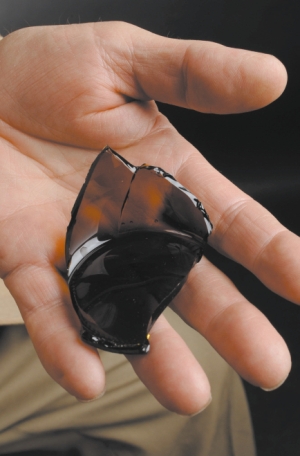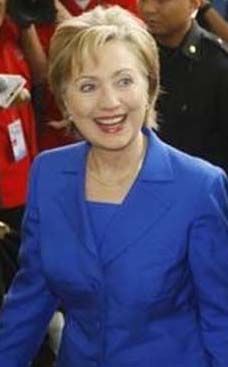
I picked up the injured child, put him on my rickety wooden kitchen table, got the porcelain pan we washed dishes in and tried to clean his bleeding foot. The bottom of a broken coke bottle was imbedded in the arch on the sole. I removed it as gently as I could. I can still see it today — a round piece of the glass bottom of a soda bottle, and a jagged piece about an inch tall and as wide sticking up from it ... a virtual glass land mine awaiting a barefoot boy. As a Boy Scout in Ohio, I had earned my first-aid merit badge. I had been through the Army basic training first-aid classes, and I had my Peace Corps first-aid kit — a small metal box containing basic bandages, some painkillers and first-aid cream. I did not even consider turning them away — I was here to help, wasn't I? I cleaned the glass scraps out of the wound with boiled water and tweezers, filled it with antibiotic ointment and bandaged it. I gave the by a pair of plastic shower shoes to wear and two aspirin, and they left. I asked him to come back the next day so I could check for infection. I was proud of myself. This was what the Peace Corps was all about!
Francis Koster writes: A shard of glass, a sharp lesson
Peace Corps memories: A shard of glass, a sharp lesson
Tuesday, February 24, 2009 3:00 AM
By Francis Koster
For the Salisbury Post
Caption: Francis P. Koster, a futurist and innovator, shares his memories of his experiences in the Peace Corps in Africa. Koster holds a piece of a broken glass bottle that was similar in shape to a piece of glass that he removed from the foot of a young boy during time in the Peace Corps. Little did Koster know that helping that young boy would soon get him in trouble with the local authorities. Photo by Jon C. Lakey, Salisbury Post.
I was sitting in 100-degree, humid heat in my little cement-block house with the tin roof, studying blueprints of a bridge the Peace Corps had assigned me to help local citizen volunteers build. I was just 22 years old, a white working-class kid from Ohio, had a couple years of civil engineering in college, had been in and out of the Army National Guard with six months active duty and was on this particular adventure in the country of Sierra Leone, West Africa, maybe two months. It was in the early 1960s.
There was a knock on my door.
When I opened it, I saw a boy about 6 years old from the local Mende tribe. He was being held up by his brother, about 8. Their mother was in the background wailing. The smaller boy was bleeding badly from a cut foot and was also hysterical. The older boy tried to explain what had happened, but I did not understand the local language well enough to grasp the details. What I could see was that this little kid was in a lot of pain. I was one of only a few people with more than a grade school education in the village. The nearest health care was a small missionary clinic 8 miles away by dirt road, and I did not have a vehicle. It was dusk.
I picked up the injured child, put him on my rickety wooden kitchen table, got the porcelain pan we washed dishes in and tried to clean his bleeding foot. The bottom of a broken coke bottle was imbedded in the arch on the sole. I removed it as gently as I could. I can still see it today - a round piece of the glass bottom of a soda bottle, and a jagged piece about an inch tall and as wide sticking up from it ... a virtual glass land mine awaiting a barefoot boy.
As a Boy Scout in Ohio, I had earned my first-aid merit badge. I had been through the Army basic training first-aid classes, and I had my Peace Corps first-aid kit - a small metal box containing basic bandages, some painkillers and first-aid cream.
I did not even consider turning them away - I was here to help, wasn't I?
I cleaned the glass scraps out of the wound with boiled water and tweezers, filled it with antibiotic ointment and bandaged it. I gave the by a pair of plastic shower shoes to wear and two aspirin, and they left. I asked him to come back the next day so I could check for infection. I was proud of myself. This was what the Peace Corps was all about!
The next evening the boy returned. Everything looked fine, and he left again with instructions to come back the following day. He did - his foot was healing nicely. He brought along two other children with simple wounds of various sorts. It was nothing I could not handle, but my little first-aid kit was running low. I patched them up, and since I was going to the capital city (Freetown, about two hours lorry trip away) on work-related matters, I took advantage of that trip to visit the homes of other Peace Corps volunteers and beg for supplies from their as yet unopened first-aid kits.
When I got back late that night, very tired, I found a line of about 10 children and some adults waiting for me. All were sick or wounded in some way. I do not recall how I got through that, but as I finally went to bed, my instincts were telling me I was in trouble.
The next morning the line was about 15 wounded long. I used what first-aid supplies I had left, and when they ran out, I stopped. I told the sicker ones to go on to the missionary clinic (lord only knows how they would get there), and, since I already had a full-time job, I went out on the construction site to build the bridge. I was heartsick and troubled.
During the day, I received a message by runner that the Mende local chief wanted to see me.
"Mr. Peace Corps," he said, "You are causing me a problem. Everyone in the village knows you help sick people, so now they have told others, some of whom got on lorry trips and told others up the road, and now hundreds of them are coming this way to my poor village - and we cannot take care of them. What are you going to do?"
I was stunned. All I did to start this snowball down a hill was take some glass out of a kid's foot, and now the chief was mad at me. Some Peace Corps volunteer building international understanding I was turning out to be.
He told me to sit down as he and his advisors (a circle of elderly, toothless men who spoke in the local language I could not understand) talked about the problem for a long time. They summoned the local constable for advice, and then the one primary school teacher, who spoke a little English. I could do nothing but sit there until they were done. Finally, they all turned to me, and the chief said, "You must go away for a while. When the sick people come here, we will tell them you are not here and send them back where they come from. And when you return, you must never give medicine again."
He went on to explain that the sick were raising small amounts of money from their home villages - just enough to pay lorry fare to get to health care. While they supposedly recouperated, they would need to be housed and fed, and his poor village could not even take care of his own sick. A migration of sick to his village was not in anyone's best interest. When I protested that someone needed to help, and I was willing, he silenced me, saying he was the chief, and it was his village and I was a guest. The discussion was over.
I packed up, and caught a lorry to the home of another Peace Corps volunteer about 50 miles away. Later, after consulting with Peace Corps officials, I returned to my village, and focused my work on building the bridge, and as soon as I could I transferred to another location for another project.
I never again was asked to perform first aid in that village, and to this day I don't know what I would have done if asked. I know that the first little boy would probably have gotten blood poisoning and died had I not removed the glass and applied antibiotic. I am proud that his wound looked healthy the last time I saw him. I think about him from time to time and wonder about his life. I know he changed mine
What I learned from this experience was how complex the art of being helpful is, particularly when a guest in someone else's country and culture. I learned that one cannot bail the ocean with a cup, and since then I have always tried to design solutions that solve an entire problem set, not just the symptomatic one in front of me.
- - -
Upon his return to the United States, Koster went back to college, earning his bachelor's degree, master's degree and finally his doctorate from the Program for the Study of the Future at the University of Massachusetts. He has worked as a university administrator, designed and run programs in renewable energy for electric utilities and for the last 25 years worked as vice president for innovation for America's largest pediatric specialist practice. He recently moved to Rowan County, accompanying his spouse, Dr. Carol Spalding, in her new role as president of Rowan-Cabarrus Community College.












